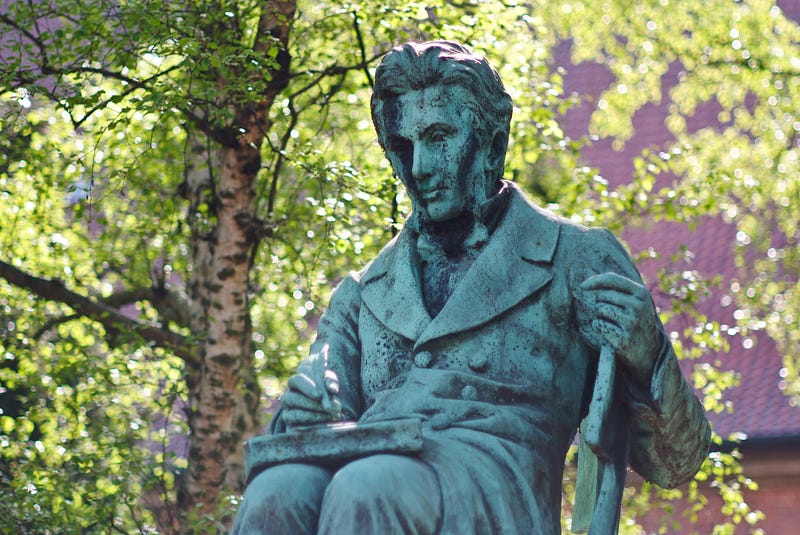
photo: Darko Popovic
What an Old Danish Philosopher Can Teach Us About Cultivating a Richer Existence
There are many ways to conceive of this huge block of time and movement that we call “life”. But one of the big problems with capturing what it’s all about is reconciling the two conceptions of life: the inner one and the outer one.
What I mean is that each of us lives both internally and externally. There is a way that our life seems to those looking at it from outside, and a way that things look and feel to us from the inside. The difference between the two is a difference of lived experience vs. observed experience. It’s the difference between subjective and objective — between science and (for lack of a better word) spirit.
In the 19th century, Danish philosopher Søren Kierkegaard identified 3 possible stages that a person can move through in their lifetime: the aesthetic stage, the ethical stage, and the religious stage. Most people only go through the first step, and mostly through the second step (though many fall short even of that one).

Kierkegaard — or at least a statue of him
Aesthetic Stage
The main motivation in this stage is pleasure. You could think of this stage as basically a from of psychological hedonism (i.e., if it feels good, it is good). In this stage, people are after pleasure, specifically the pleasure of experiencing beauty.
This is the fervor of one’s twenties — wrapped up in music, movies, and experiencing the wonder of life. The objective of each day — and life in general seems to be to collect as much experience of beauty and pleasure as possible.
I spent a long time in this stage — trying to gather all of the excitement and grandiose experience that I could. I stayed up late, shirked responsibilities, and lived fast. My thought process was entirely focused on the present, and entirely focused on myself. But I wasn’t focused on enrichment (i.e., making myself better). I was focused on personal gain. And those are two different things.
Enrichment involves becoming a better person. Gain involves just getting more — more stuff, more experiences — but not necessarily becoming any better for it. I involved precious few others in my life. I was not there for anyone, and as a result, nobody was really there for me. That’s the aesthetic stage, and it’s a lonely and constantly disappointing existence.
Ethical Stage
In the Ethical Stage, a person has risen above her aesthetically focused mode of operation, and has begun to follow the rules and laws of her society. Inclinations give way to obligations. We feel responsibilities toward others — both particular others and others in general. We have kids, pets, jobs and coworkers, neighbors, mature friends.
Our relationships in this stage are no longer understood as transitory — whereas in college or our late adolescence, they were. There are more complex expectations, desires, and commitments in place. We also tend to understand who we are in terms of those commitments.
In many ways, coming into the ethical stage is an act of throwing ourselves down in subservience — but in a positive and constructive way. Whereas we were once merely individuals, out for our own gain and enrichment, we have now recognized principles worth submitting to. Now we operate based on something other than our fleeting desires and appetites; we try to do the right thing and the rational thing.
I entered this stage when I married and had children. It was a process. I slowly shed my concept of who I was in terms of what I had, or what I had done, and began to see myself as someone there for others — as a partner and a father. I also began my career, and I began to see myself as a colleague and friend to those with whom I work. My objectives became much less about what I could gain (whether material thing or experience), and more about what I could do to be a better person for others.
That is the Ethical Stage — you realize yourself as intimately tied to others and society, and enrich those ties. It is where many of us exist as adults. But it is not the end of the stages of existence.
“Religious” Stage
For Kierkegaard, the highest stage of life that humans can hope to be is what he calls the “Religious” Stage. Now, Kierkegaard was a Christian — that’s no secret. But the “religious” stage does not essentially involve any particular deity or belief system. It’s not about that. Rather, it’s about progressing past the previous two stages in life — and onto something profound and pulsating.
The move from the Aesthetic Stage to the Ethical Stage is about moving away from particular things (possessions, experiences, people) and toward general things (principles, obligations, order & progress). But after some time, that can begin to feel routine. It can feel as if there is no higher purpose in it, other than to continue on doing the right thing — fulfilling obligations.
This final stage involves something more: a leap of faith. For Kierkegaard, this meant taking the leap of faith in a deity. But the characteristics of the leap can be (and I think should be) generalized to other things. The leap of faith involves embracing a belief in something that you may not be able to prove to others. It involves the kind of faith or (to use a less loaded term) confidence that comes from an internal passion and excitement. But it is the kind of belief that moves you because it is utterly individual and unique. Kierkegaard describes the feeling as “simultaneously to be out on 70,000 fathoms of water and yet be joyful.” It’s a kind of awesome fear and excitement, all wrapped up into one.
We read about this leap all of the time — in the form of those who have taken it more publicly. Visionaries and thought leaders who press toward the unknown future with a seemingly unmatched clarity. But not those in it for the financial gain or the glory — those who are in their chosen pursuit for its own sake. In other words, no passion and purpose heartfelt on an individual level, the reason it’s not about the individual, but rather the art, science, or mission being pursued. In short, it is about giving ourselves over to something higher than just us or just our role in society.
The Question For You
So which stage do you find yourself in? What motivates you? Is there a purpose in view — one that isn’t about personal gain or just meeting obligations? Where does your leap happen? Are you willing to take it?